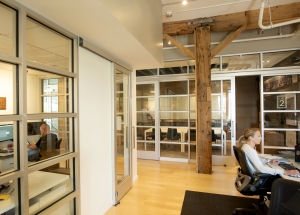Preventing Burnout: How To Stay Connected When You Disconnect
We have all heard of burnout.
Many of us have unfortunately experienced it first hand.
In the fast paced, sleepless world in which we currently live, more and more pressure is being put on employees to dissolve their ideas of "workday hours" and work until a project gets finished.
The absence of physical boundaries leads to the absence of mental boundaries, which can still lead to working overtime and burning out from high self-expectations.
The positive side of the modern work culture shift is that it promotes more flexibility for employees to enjoy exercise and other healthy activities before, during, and after work, allowing them to explore or maintain a sense of what uniquely fulfills them and helps them sustain productivity when they choose to be in the office.
Because the structure and culture of work has changed, so has the cause of burnout, and so has the ways that are best to respond to that burnout.
An article in Forbes mentions the idea of "digital burnout" and how our devices make it difficult for us to stop working due to such easy access to email at all times.
The common suggestion to deal with the technological overwhelm and work burnout is to disconnect.
The one problem? People do not know how to recharge.
We spend so much time staring at a screen or responding to a text that if we actually turn off the devices and sit down in the deathly quiet, our brains are not conditioned to know what to do next.
The author suggests a new solution of connecting in a different, healthier way instead of completely disconnecting and dropping into solitude for a while.
The author describes this new kind of connection in a few ways:
- Connecting with yourself - Know what actually feels healthy for you. If you recently tried yoga, do some yoga. Even for ten minutes in your living room. The key is to keep it simple so that the activity you choose is still ultimately relaxing.
- Connect with others - Again, keep it simple. Set up a coffee date in advance with a friend to just sit and chat. Or invite a friend to walk with you at the dog park. Hand-write a note and send it to a family member, the old-fashioned way.
- Connect with the world - Think about something that scares you or represents a total break of your status quo. Take a road trip, try a random restaurant, read a hardcover book.
Pro tip: Take these three categories and make lists of ideas uniquely for the things that feel healthy for you. That way, when the time comes that you feel the burn coming on, you have a pre-set menu of things that will help you recharge in a healthier, thoughtful way.
How To Prevent Burnout? Know Thyself
Have you ever experienced burnout from work? Like, true burnout?
When you hate everything and everyone and every tiny task feels like it requires every cell in your body to wake up and do something in order for you to find a shred of motivation necessary to maintain productivity or success in your workplace?
It's more common than you think, and is often related to deadlines, pressure from bosses or colleagues, and long hours.
The problem with burnout, however, is the fact that it occurs because an individual did not speak up for their needs soon enough before they got disgruntled and began to blame other people / things instead of address the unhealthy fire raging inside of them.
For instance, if communication with your team is strained and you brush it off at the end of every day and say "It's fine, that's why it's called work", you will never actually address the issue. Instead you will suppress more and more anger with that erroneous excuse until you burn out and cannot function at work.
This scenario can be resolved much earlier by going to a supervisor and simply asking for advice.
The reason why burnout has remained a consistent event in a lot of offices is because companies are placing value on the wrong things. Certainly companies want their employees' work to get completed by whatever means necessary but, as Aytekin Tank, founder of JotForm, states:
"We’ve grown to subconsciously measure a person’s worth based off how many hours they work, how much is on their plate and put simply — whether or not they are running around like a chicken with their head cut off."
A lot of companies are getting wise to the self-care trend of offering exercise, yoga, meditation, food, drink, and nap pods in their offices to help their employees, but Tank offers the simple and cost effective intervention of advocating for yourself.
If there is a way that you know you would be more productive (working at home, from a coffee shop, in the afternoons, etc.), all you have to do is ask.
What was the last thing for which you advocated from your boss?
What should you consider advocating for right now to prevent burnout?


